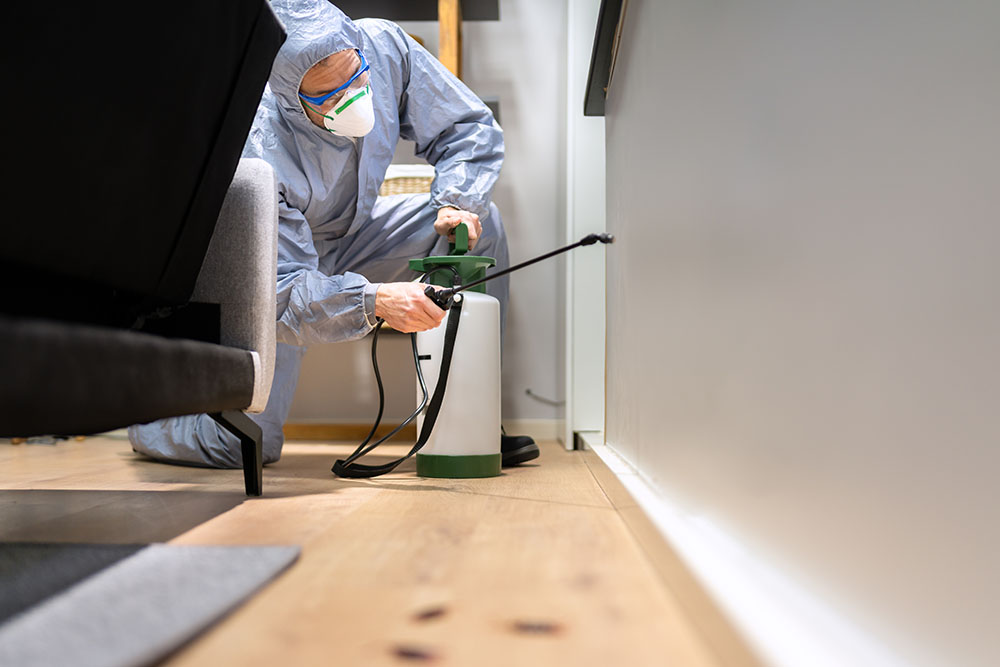Are Landlords Responsible For Pest Control?

CONTENTS
- What are a landlord's responsibilities for pest control?
- How are tenants responsible for pest infestations?
- How can a tenancy agreement dictate responsibility?
- How can a property's condition attract pests?
- What can landlords do to prevent pest infestations?
- What can you do if your landlord ignores a pest problem?
- Can you handle a pest infestation yourself?
- Frequently asked questions
- Get in touch
Pest control responsibility can be complex for landlords and tenants. The roles and responsibilities can be blurred, leading to accountability issues. Both parties must work together to establish clear guidelines for addressing pest control to resolve it efficiently.
At ICE Cleaning, our pest control services offer emergency or out-of-hours assistance across the UK. We can be on-site at your earliest convenience, tackling pests from rodents and birds to insects.
Read on to learn more about who is responsible for a pest infestation on a rental property.
What are a landlord's responsibilities for pest control?
When maintaining rental properties, landlords have a legal obligation to ensure the health and safety of their tenants. This includes taking appropriate measures to prevent and address pest infestations.
Understanding the scope of these responsibilities can help landlords and tenants navigate issues related to pest control efficiently.
In the UK, various pieces of legislation outline a landlord's duty regarding pest control within rented accommodations. The Housing Act 2004 sets clear expectations for property conditions, including being free from pests that could harm a tenant’s health or well-being.
A crucial aspect of these laws is the 'fitness for habitation'. As per The Homes (Fitness for Human Habitation) Act 2018, rental properties must be safe, healthy, and free from things that could cause serious harm - including pest infestations.
How are tenants responsible for pest infestations?
While it some believe that pest control falls solely on the shoulders of property owners, tenants play a crucial role in preventing infestations. Understanding these responsibilities can help ensure a healthy, safe living space. To prevent pests, tenants should adopt several proactive habits:
- Regularly dispose of waste and use sealed containers
- Keep the property clean, especially kitchens and bathrooms
- Reduce clutter and ensure objects are stored properly
If an infestation occurs, timely reporting is essential to tackling the issue early. Here is what tenants must do in the event of a pest infestation:
- Contact your landlord immediately
- Take photos or videos as evidence
- Familiarise yourself with your rental agreement regarding pest control responsibilities
Prompt action helps protect you and prevents the spread to neighbouring properties, which could cause widespread issues.
How can a tenancy agreement dictate responsibility?
Tenancy agreements often contain specific clauses for maintenance and repairs, including pest control measures.
Landlords are often responsible for ensuring the property is habitable at the start of the lease. However, ongoing responsibilities may shift depending on various factors outlined within your contract:
- Preventive measures: Some agreements state that tenants must conduct preventive measures to avoid infestations - including regular cleaning or banning activities that attract pests.
- Reporting obligations: It is common for contracts to require tenants to report any signs of pests. Delayed reporting can exacerbate issues and might lead to disputes over accountability.
- Cause-based responsibility: If an infestation occurs due to tenant negligence, they might be held responsible for pest control costs.
To navigate these complexities effectively, both parties should consult professionals specialising in property law. They can provide tailored advice based on individual circumstances and ensure compliance with local regulations.
How can a property's condition attract pests?
Maintaining cleanliness and overall property condition is crucial in preventing rodents, insects, and other pests. A well-maintained property provides a healthy environment for its occupants and acts as a deterrent to pest infestations.
Clutter and waste
Cluttered spaces provide perfect hiding spots for pests like mice, rats, and cockroaches. Similarly, accumulated waste serves as a shelter and food source for them.
Ensuring regular waste disposal and decluttering spaces are effective steps towards making your premises less appealing to pests.
Damp and water leaks
Damp conditions attract many types of pests, including woodlice, silverfish, and certain species of ants that seek moisture for survival. Water leaks from faulty plumbing create ideal breeding grounds for them.
Regularly inspecting pipes for leaks and ensuring good ventilation throughout the property will significantly reduce moisture levels, deterring pests.
Poor building maintenance
A poor approach to building maintenance often results in structural weaknesses pests exploit, which cause significant damage over time.
Sealing cracks around windows, doors, and foundation walls with appropriate materials prevents easy access points into your home or business.
What can landlords do to prevent pest infestations?
Landlords must take proactive measures against pest infestations, which can pose significant health risks and lead to costly damages. Landlords can significantly reduce the likelihood of these unwelcome guests by adopting these strategies:
- Regularly inspecting the property
- Sealing entry points
- Ensuring proper waste management
- Ensuring cleanliness
- Repairing leaks
- Installing screens on windows and doors
- Educating tenants on prevention
- Conducting regular pest control treatments
- Ensure well-maintained gardens
- Encourage the use of food storage containers
- Use pest-resistant materials during renovation
What can you do if your landlord ignores a pest problem?
In the UK, landlords must ensure their properties meet strict health and safety standards, which include pest control. By failing to follow the law, they could be liable for any harm or damages caused by pests.
You must inform your landlord of the pest problem in writing, providing detailed information about what you have observed.
Keep copies of all communications as evidence should further action be necessary. A professional tone may encourage cooperation from your landlord.
If attempts to resolve the issue directly with your landlord fail, contact your local council. Under The Prevention of Damage by Pests Act 1949, they can push landlords to take action on infestations that could affect public health or cause damage.
In extreme cases where health risks are evident and you receive no assistance, seeking legal advice might be necessary.
Solicitors specialising in housing law can offer guidance based on specific circumstances, including potential claims for negligence against landlords who fail to deal with pests.
Can you handle a pest infestation yourself?
DIY methods often seem appealing due to their immediate availability and low cost. From over-the-counter sprays to natural remedies, homeowners attempt strategies for quick eradication.
However, these solutions may only offer temporary relief or target visible symptoms rather than addressing underlying causes. Identifying specific pests and applying correct treatments without professional expertise becomes challenging, potentially exacerbating the problem.
When infestations are severe or persistent — such as wasps nests or large populations of bedbugs — professional intervention is integral.
Landlords must also ensure properties meet health standards free from pest-related hazards, so employing expert services is obligatory in some scenarios.
Professionals can safely handle chemicals that could be harmful if misused. Experts also have access to more potent, long-term solutions not available publicly, ensuring the elimination and prevention of infestations.
Frequently asked questions
Are landlords liable for pest control?
In the UK, landlords must tackle infestations before tenants move in and address structural issues causing pests.
Who handles pest control in a rental property?
Landlords are responsible for structural problems leading to pests. Tenants may be liable if their actions or behaviours attract pests.
Can I end my tenancy early due to rats?
If rats are down to landlord neglect, you might be able to break your lease - but speak to a solicitor first.
Is pest control free UK?
No, but some councils offer discounted services for residents facing common pests like rats or mice.
Get in touch
For efficient pest control services, contact our team at ICE Cleaning. Our team of pest control experts can effectively find the source of the pests, remove it and help you prevent future infestations.
To learn more about our pest control services, get in touch with our team today at 0208 066 0360 or enquiries@icecleaning.co.uk. We operate nationwide and offer emergency pest control services - ensuring your needs are met 365 days a year, 24/7.

Speak with me today,
I’m here to help
By asking you a few questions either via phone or email I can immediately provide a realistic estimation of the cost.

Why choose us?
- Cater to a wide variety of cleaning situations
- Nationwide coverage, available 24/7
- Cater to commercial and domestic clients
- Free survey provided prior to quotation
- Emergency response team
- Offer a bespoke service designed to suit all your needs
- All technicians hold professional health and safety qualifications, including BICSc, IOSH, Dewpoint Professional & Safe Contractor
We’re fully accredited
We place best practise, professional expertise and health and safety at the core of our business. We’re fully compliant with all legal obligations. You can view a list of our accreditations below, or visit our Health & Safety page for more information.











-RGB-small.1707319151.jpg)




















